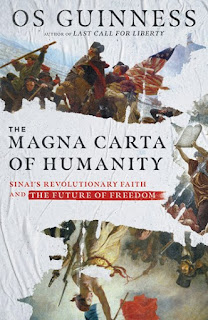"The Magna Carta of Humanity" by Os Guinness. A Review
Sometimes it takes non-American eyes to see America well. Os Guinness, born in China and expelled by the Chinese Revolution in 1951, prolific author, social critic, senior fellow at the Oxford Centre for Christian Apologetics and founder of the Trinity Forum, has a pair of those eyes, and shares his observations regularly. His most recent survey and evaluation has come forth in his new 288-page hardback "The Magna Carta of Humanity: Sinai's Revolutionary Faith and the Future of Freedom". This densely argued dossier is a valuable excursion through history, political philosophy, economics, Bible, theology, social analysis, as well as the "is" and "ought to be". This is an adult manuscript that forms readers into citizens, and citizens into neighbors.
Guinness picks up his theme from a previous work distinguishing between the French Revolution (1789) and the American War of Independence (1776). He chronicles the rise of five revolutionary epochs, dissecting each one to show their innards and inner workings, and addresses the present moment with its revolutionary liberationism. Here the author spends much of his time assessing the faith and religious diktats of this movement, including it's "hi-tech resuscitation of ancient Gnosticism" (75), victimology, eschatological expectations, neo-puritanism, and salvific endeavors of might over right. As it unfolds, chapter upon chapter, it gives thinking readers much to ponder, repent of, return to, and revalue.
Though it would be easy to think this work is criticizing "that" group or "those" people, Guinness will not allow us such luxuries. Every conclusion ends up cutting "Right" and "Left" exposing the soft underbellies of conservatives and liberals. For example, as he addresses the present hermeneutics of suspicion (interpreting every thing, every action, every literary work, etc. as a power ploy or coming from oppressive intent) the author states that the "outcome is an aging society fueled by pervasive suspicion, mistrust, rumor, conspiracy theories, and cynicism" (112). We've all swallowed that postmodernist pill! Another specimen of this is as he discusses "rights" he makes the perceptive observation that rights and responsibilities go together, and that when the "clamor for rights is pursued solely in the name of individuality, there will be an even greater proliferation of claims and a weaker response to any of them, and the end will be conflict and lawsuits without end" (227). One of the author's main working suppositions is that each of us is part of the disease, and haven't been much about the remedy. "We too are the problem. The human problem is never simply out there but always in here too" (120).
But unlike some social critics, Guinness runs through each chapter with thoughtful corrections and guides for (re)newed directions. To paraphrase Martin Luther King Jr., his slogan is not “Burn, baby, burn.” Rather, “Build, baby, build.” “Organize, baby, organize.” “Learn, baby, learn.” The author exposes how our house has termite damage, dry-rot, and leaks, and then brings out ways to remodel and revamp to restore. And he draws deeply from God's liberation movement where he emancipated his people from Egyptian oppression and set them on a path of true liberty at Sinai.
Guinness rightly sees that faith "in God is therefore protest against any and every status quo and all abuse of power" (12). It is a book for those who are ready to reassess our place in history and our moment. It is a volume that calls God's people to repentance and forward to liberty - liberty as God defines liberty. I highly recommend the book.
My thanks to IVP for responding to my request for a review copy. They happily sent it, and gave me the latitude to come up with my own assessment. Therefore, this evaluation is mine, freely made and freely given.




Comments